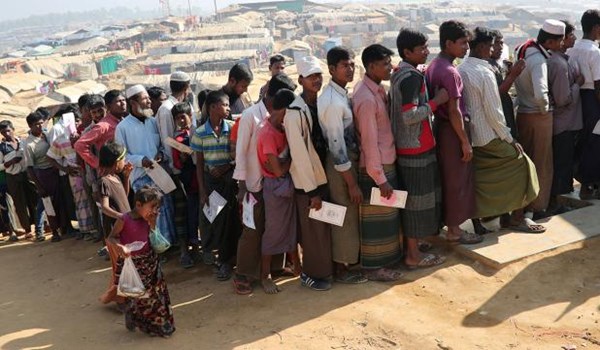
RNA - More than 700,000 members of the Muslim minority group have fled the state-sponsored violence to southeast Bangladesh since the military launched a crackdown on the Rohingya last August. The UN has described the campaign as a textbook example of "ethnic cleansing," saying it possibly amounts to "genocide" as well.
Bangladesh and Myanmar reached an agreement in December for the repatriation of the Rohingya to begin in January. However, many refugees still refuse to return to Myanmar out of fears that they might be subject to renewed crackdown by the military and Buddhist mobs.
According to the UN, few concrete details were decided in the newly-signed "framework" deal that took months to draft and aims to pave the way for voluntary repatriation of Rohingya refugees.
The UN agencies will initially conduct assessments in Rakhine state, which has been largely closed off to outsiders since the crackdown began.
"The work so far has been to open the door," said Knut Ostby, the UN's resident coordinator in Myanmar. He said he could not acknowledge the extent of the access the UN teams would be granted or which areas would be prioritized.
The Myanmar representative for the UN refugee agency, Giuseppe De Vincentiis, said they hope to begin the repatriation "as soon as possible," adding that the initial assessment phase would be finished in the coming months.
"Based on our reading, the situation at the moment is not conducive for repatriation," De Vincentiis said , expressing hope the agreement would eventually enable refugees to make a "well-informed" decision about whether to return or not.
Human rights groups say Myanmar should open Rakhine to independent observers and take important steps toward treating the Rohingya as full citizens.
"If this agreement can help the UN access areas the government has blocked, that's good, but this doesn't represent any fundamental change on the ground," said Matthew Smith, co-founder of NGO Fortify Rights.
According to Press TV, though the Muslim community has lived in Myanmar for generations, its members are denied citizenship.
Myanmar has denied a UN Human Rights Council fact-finding mission access to the country and barred the UN special rapporteur on human rights in Myanmar, Yanghee Lee, rejecting accusations of "ethnic cleansing" against Rohingya Muslims.
But Ostby confirmed that the new UN envoy for Myanmar, Christine Schraner Burgener, would visit the country "very soon" for talks on the refugee crisis.
847/940